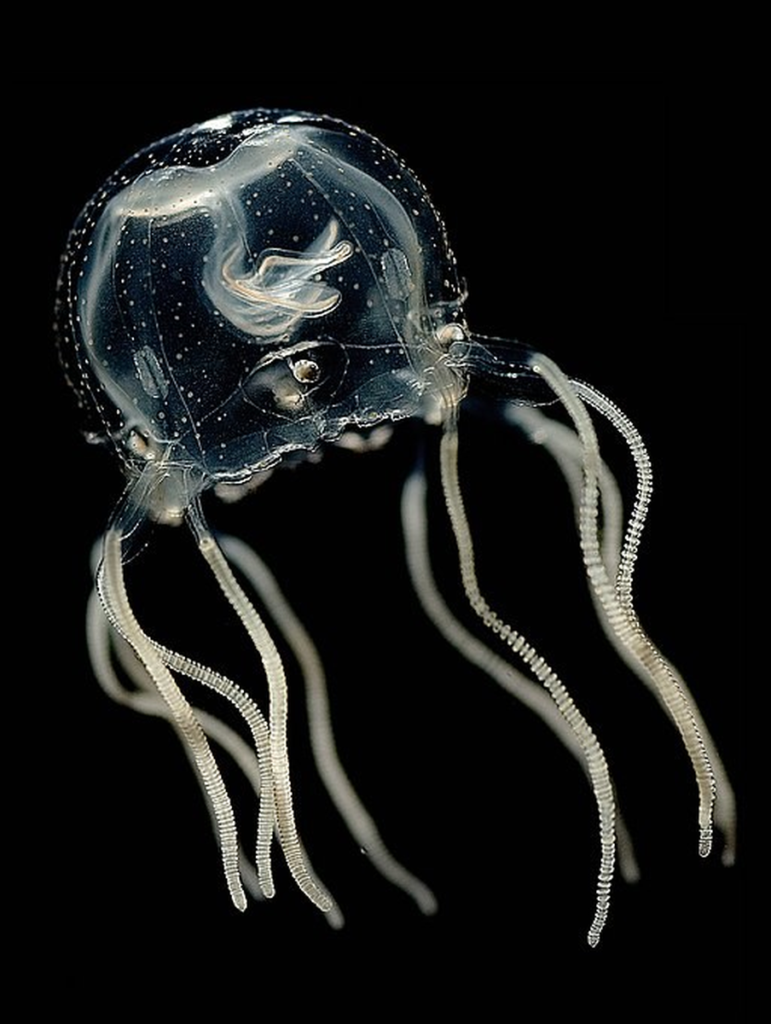Jellyfish are fascinating creatures that have been the subject of much scientific study and speculation. One of the most intriguing questions about jellyfish is whether or not they have eyes. The answer is yes, but not in the way that you might expect.
Unlike humans and many oher animals, jellyfish don’t have a centralized nervous system or a brain. However, they do have a network of nerves that allows them to sense their environment and respond to stimuli. In some species of jellyfish, these sensory nerves are located in specialized structures called rhopalia, which are positioned around the edge of the bell-shaped body.
Rhopalia are unique structures that contain several small sensory organs, including light-sensitive cells called ocelli. These ocelli are similar to the eyes of other animals, but they are much simpler in structure and function. Ocelli are capable of detecting light and dark, and they allow jellyfish to navigate and orient themselves in their environment.
While jellyfish don’t have the complex visual system that humans and other animals do, they are still able to perceive their surroundings and respond to stimuli. Some species of jellyfish, such as the box jellyfish, have been observed using their sense of vision to identify preferred habitats and locate prey.
In addition to their visual senses, jellyfish also have other sensory organs that allow them to detect changes in temperature, salinity, and other environmental factors. These sensory abilities allow jellyfish to survive and thrive in a wide range of aquatic environments, from shallow reefs to deep ocean waters.
While jellyfish may not have the same kind of eyes that humans do, they do have specialized sensory organs that allow them to perceive light and dark and respond to their surroundings. These unique structures are just one of the many fascinating adaptations that allow jellyfish to survive and thrive in the ocean.
How Jellyfish Perceive Their Surroundings
Jellyfish, unlike humans, do not have eyes in the traditional sense, but they do have specialized structures known as rhopalia, or eye spots. These are located arond the edge of their bell-shaped body and contain a small sensory structure called a statocyst, which helps the jellyfish maintain balance and orientation in the water.
Each rhopalium also contains multiple photoreceptor cells, which can detect light and shadow and allow the jellyfish to sense changes in light and darkness. These photoreceptor cells are sensitive to different wavelengths of light, which means that jellyfish can perceive different colors and intensities of light.
Interestingly, some species of jellyfish also have specialized pigments in their rhopalia that help them detect polarized light, which can help them navigate and find prey in the water.
Overall, while jellyfish do not see in the same way that humans do, their rhopalia and photoreceptor cells allow them to sense and respond to changes in their environment and navigate the water in search of food and mates.

Can Humans Be Seen by Jellyfish?
Jellyfish, in general, do not have complex eyes like humans or other animals, but some species are capable of sensing light and distinguishing it from darkness. However, it is highly unlikely that jellyfish can “see” humans, in the same way, we see them. Their visual system is not advanced eough to identify complex shapes or colors. Instead, jellyfish use their sense of touch and chemical cues to detect their prey and avoid predators. Nevertheless, it’s important to note that some species of box jellyfish, such as Tripedalia cystophora, have more advanced visual abilities, and they can use their eyes to locate prey or navigate through their surroundings. In summary, while it’s possible that some jellyfish can detect our presence, they are likely unable to “see” us in the way we understand the term.
Do Jellyfish Possess Self-Awareness?
Jellyfish do not possess a brain or a central nervous system, which are the key organs responsible for consciousness and self-awareness in animals. As a result, they lack the ability to perceive their own existence or the world around them in the same way that humans or other complex organisms do. Unlike humans or other animals, jellyfish are driven purely by instinctive behaviors and reflexes, responding to external stimuli such as light, touch, and chemicals in their environment. While jellyfish may exhibit certain behaviors that suggest a level of awareness, such as avoiding predators or seeking out food sources, these actions are not linked to a sense of self or a conscious understanding of their own existence. Therefore, it can be concluded that jellyfish do not know they exist in the way that we understand it.
Do Jellyfish Possess Cognitive Abilities?
Jellyfish are fascinating creatures that lack a centralized brain, so they do not have the ability to think or feel in the same way that humans or other animals with complex nervous systems do. However, they do have a basic set of nerves located at the base of their tentacles, which allow them to detect varius stimuli such as touch, temperature, and salinity. These nerves are connected to a simple nervous system that allows the jellyfish to respond to these stimuli in an automatic manner, without any conscious thought or decision-making. So while jellyfish may not be able to feel or think in the same way that we do, they still have a level of sensory perception that allows them to navigate their environment and respond to changes in their surroundings.
Are Jellyfish Good Companions?
Jellyfish are not typically considered friendly creatures, as they lack the ability to form social bonds or interact with humans in a positive way. While some species of jellyfish may not pose a threat to humans, many others have venomous stingers that can cause pain, paralysis, and even death. Additionally, jellyfish are not domesticated animals and are not suited for pet ownership or close interaction with humans. It is important to exercise caution and respect when encountering jellyfish in their natural habitats to avoid any potential harm.

What Are the Effects of a Jellyfish Touch?
If a jellyfish touches you, its long tentacles may inject venom from thousands of microscopic barbed stingers into your skin. This can cause instant pain and inflamed marks on the affected area. In some cases, the sting may also cause more whole-body (systemic) illness, such as nausea, vomiting, headache, muscle cramps, and difficulty breathing. In rare cases, jellyfish stings can be life-threatening, especially if the person is allergic to the venom or if the sting affects vital organs such as the heart or the lungs. It is important to seek medical attention immedately if you experience a jellyfish sting, especially if the symptoms are severe or if you have been stung by a box jellyfish or a Portuguese man-of-war, which are known to have highly toxic venom.
The Dangers of Touching a Jellyfish Head
Yes, you can touch the head or top of a jellyfish without being hurt, as long as the tentacles are not present. The tentacles are what produce the sting and can case irritation or even injury to humans. It is important to avoid touching any part of a jellyfish that has visible tentacles, as they can release venomous stingers into your skin. It is also important to note that some species of jellyfish may have small, hard-to-see tentacles that can still cause harm even if they are not easily visible. If you come into contact with a jellyfish, it is recommended to rinse the affected area with vinegar and seek medical attention if necessary.
Conclusion
In conclusion, while jellyfish do not have eyes in the same way that humans do, they do possess specialized structures called rhopalia, which act as eye spots. These rhopalia are located around the edge of the jellyfish bell, and they allow the jellyfish to detect light and distinguish btween different types of light sources. The use of these rhopalia has been observed in various jellyfish species, including Tripedalia cystophora and box jellyfish, which use their sense of vision to identify preferred habitats and locate prey. Therefore, while their vision may be less advanced than that of humans, jellyfish are still able to perceive their surroundings and adapt their behavior accordingly.
